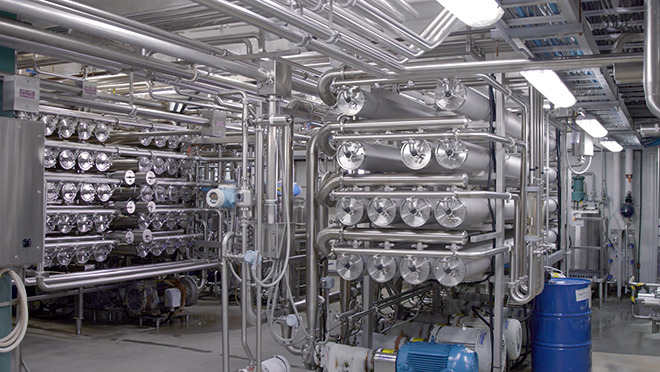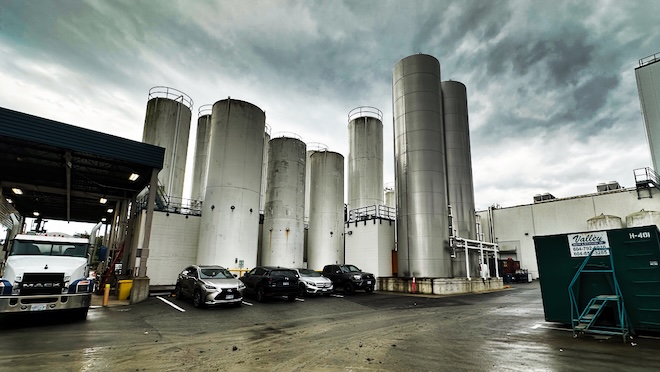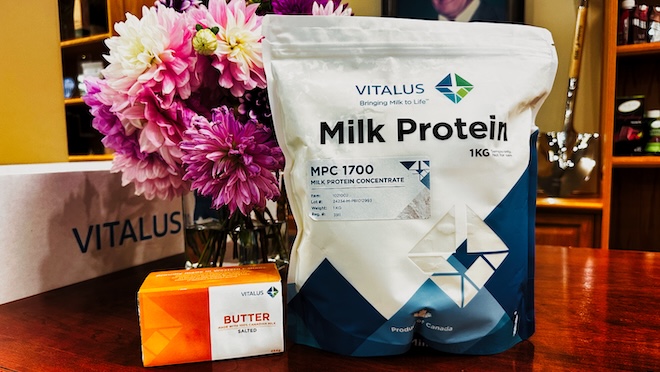 Vitalus Nutrition's dairy processing facility in Abbotsford utilizes ultrafiltration technology to separate milk proteins, forming the base for high-purity milk protein concentrates (MPC) and isolates (MPI)— ingredients used in a variety of nutritious foods and beverages.
Vitalus Nutrition's dairy processing facility in Abbotsford utilizes ultrafiltration technology to separate milk proteins, forming the base for high-purity milk protein concentrates (MPC) and isolates (MPI)— ingredients used in a variety of nutritious foods and beverages.
Vitalus Nutrition's power moves make it a Clean Energy Champion
Part of a series on BC Hydro Clean Energy Champions: businesses, homes, and institutions – large and small – recognized for reducing energy use and their reliance on fossil fuels.
Even if Vitalus Nutrition hadn't embraced energy efficiency and decarbonization, they would have heard about it from their customers.
"We're dealing with a lot of large multinationals, and more and more of these companies want to be able to understand their carbon footprint and communicate it to their customers and their investors," says Travis Drew, VP of operations for Vitalus Nutrition. "We have to make sure we're servicing those customers the best we can, and that includes understanding our contribution to the carbon footprint of the whole supply chain."
With the purpose of improving lives by unlocking the nutritional value of milk, Vitalus sources milk from Fraser Valley farms and transforms them into specialty dairy ingredients, such as milk protein concentrates and isolates, prebiotic fibre products, cream and butter for industrial use. The company also markets its products to companies that produce protein powders, infant formulas, healthy living, and products for the healthy aging nutritional market.
Extracting nutritional components from milk is an energy-intensive process, and is a longstanding energy-intensive challenge for the food and beverage industry. But the company has taken some big steps to extract energy efficiencies out of its current operation and through investments in more efficient equipment as part of a facility expansion that will increase its processing capacity.
Vitalus got the energy efficiency wagon rolling by joining BC Hydro's strategic energy management program (SEM) and identifying 417 energy-saving opportunities. They delivered on more than 176,972 kWh estimated energy savings in the first year of the program, then went even bigger the next year, saving 184,556 kWh in estimated energy savings.
Along the way, they learned not just where – but how – to look for fixes.
"One of our big savers was identifying leaks in our compressed air systems," says Drew. "In our first run-through, we didn't identify many leaks and thought we were actually doing a really good job preventing them. Then we purchased an air detection unit and retested, finding about 76 different spots where there were minor leaks. They weren't large enough to actually feel or see, but those little things really add up. "
All those kilowatt-hours saved under year 2 of the SEM program would be enough to power up to 90 electric vehicles for a year, or to deliver a year's worth of heating and cooling in 30 B.C. homes equipped with electric heat pumps.
And that's just the start.
 Vitalus Nutrition uses these large milk and water silos to hold raw milk when it comes into the plant.
Vitalus Nutrition uses these large milk and water silos to hold raw milk when it comes into the plant.
The Government of BC is contributing as much as $25 million toward Vitalus Nutrition's expansion to a 143,500-square-foot facility in Abbotsford. The funding is part of Clean and Competitive: A Blueprint for B.C.'s Industrial Future [PDF, 13.8 MB], the Province's plan for new investment and job creation around clean energy and sustainable industries in B.C.
The larger manufacturing plant will increase B.C. dairy processing capacity by 50%, and will create as many as 100 new jobs at the site. The facility will also allow local producers to better meet demand for a multitude of dairy-based products that range from butter to proteins.
"The expansion represents a significant investment in the agritech sector in B.C and western Canada," says Drew. "It's much easier to be more environmentally responsible when you start with a brand new facility, because you get to start from scratch to make everything as efficient and optimal as you can."
BC Hydro has encouraged Vitalus to explore efficiency and potential decarbonization measures in as much equipment as possible in the new plant. The new facility will be utilizing centrally located LED lighting, air compressors, ammonia refrigeration, boilers, heating and cooling, and variable frequency drives.
Vitalus has also had some success experimenting with BC Hydro's demand response program, which offers rewards for manually shifting some electricity use away from peak demand periods on the electricity grid. Vitalus saved an average of 221 kW per event and earned rewards of more than $16,000 during the 2024-25 winter season.
"The food industry is a great industry to be in, and it's more advanced than people realize," says Drew. "I think that we're all working hard with companies like BC Hydro to make sure we're doing what's best for the environment. And I think we're very fortunate to have BC Hydro as a partner. They're very forward thinking and put a lot of effort into working with industrial partners like us."
 Vitalus produces protein concentrate for global markets and the expansion will increase the level of locally-produced butter to serve the Canadian market.
Vitalus produces protein concentrate for global markets and the expansion will increase the level of locally-produced butter to serve the Canadian market.
A wrestler from Saskatchewan embraces energy savings
Raised in Saskatoon in a family that also ran a small farm near Regina, Drew earned a degree in agricultural science from the University of Saskatchewan, where he starred as a national champion wrestler.
He came to B.C. to take a job at a Safeway's fruit and vegetable packing facility, then took various jobs in the B.C. food industry including a number of blueberry operations. Then came the chance to join Vitalus and, specifically, to be part of the company's plant expansion.
"This is probably a personal thing for me, but I've always been proud about being in the food industry," he says. "You're providing food for people, and when you're in agriculture, you're Intertwined with your products, whether it's by growing them or managing animals.You're very connected to the environment and the maintenance of soil, air, and water – for now and for the future."
"I've always had a personal interest in being involved with and making sure that we're doing our part."